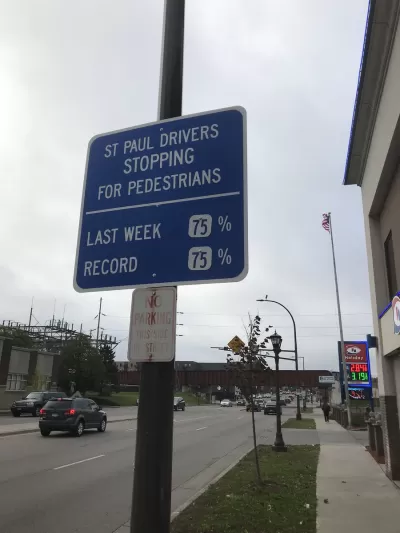A new study sheds light on what actually convinces drivers to slow down and stop for pedestrians.

Angie Schmitt reports on the findings of an analysis by Nichole Morris, director of the HumanFIRST Laboratory at the University of Minnesota, of drivers yielding at crosswalks around St. Paul.
Morris and her team initially found yielding rates were dreadful: Only 32 percent of drivers stopped. But they were able to improve that number more than double that using “human factors psychology,” which is focused on altering group behavior.
Human factors psychology includes other jargon-y sounding terms like "social norming" and "implied surveillance." But Schmitt interviews Morris in person to clarify more of the concepts behind this tool for convincing drivers to slow and even stop for the safety and right of way of pedestrians.
FULL STORY: To Get Drivers to Yield, St. Paul Uses Psych Trick

Alabama: Trump Terminates Settlements for Black Communities Harmed By Raw Sewage
Trump deemed the landmark civil rights agreement “illegal DEI and environmental justice policy.”

Planetizen Federal Action Tracker
A weekly monitor of how Trump’s orders and actions are impacting planners and planning in America.

The 120 Year Old Tiny Home Villages That Sheltered San Francisco’s Earthquake Refugees
More than a century ago, San Francisco mobilized to house thousands of residents displaced by the 1906 earthquake. Could their strategy offer a model for the present?

In Both Crashes and Crime, Public Transportation is Far Safer than Driving
Contrary to popular assumptions, public transportation has far lower crash and crime rates than automobile travel. For safer communities, improve and encourage transit travel.

Report: Zoning Reforms Should Complement Nashville’s Ambitious Transit Plan
Without reform, restrictive zoning codes will limit the impact of the city’s planned transit expansion and could exclude some of the residents who depend on transit the most.

Judge Orders Release of Frozen IRA, IIJA Funding
The decision is a victory for environmental groups who charged that freezing funds for critical infrastructure and disaster response programs caused “real and irreparable harm” to communities.
Urban Design for Planners 1: Software Tools
This six-course series explores essential urban design concepts using open source software and equips planners with the tools they need to participate fully in the urban design process.
Planning for Universal Design
Learn the tools for implementing Universal Design in planning regulations.
Clanton & Associates, Inc.
Jessamine County Fiscal Court
Institute for Housing and Urban Development Studies (IHS)
City of Grandview
Harvard GSD Executive Education
Toledo-Lucas County Plan Commissions
Salt Lake City
NYU Wagner Graduate School of Public Service





























